
|
You entered: NEAR project
 M31: The Andromeda Galaxy
M31: The Andromeda Galaxy
24.07.1995
Andromeda is the nearest major galaxy to our own Milky Way Galaxy. Our Galaxy is thought to look much like Andromeda. Together these two galaxies dominate the Local Group of galaxies. The diffuse light from Andromeda is caused by the hundreds of billions of stars that compose it.
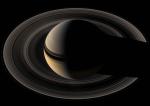 Crescent Saturn
Crescent Saturn
23.10.2007
Saturn never shows a crescent phase -- from Earth. But when viewed from beyond, the majestic giant planet can show an unfamiliar diminutive sliver. This image of crescent Saturn in natural color was taken by the robotic Cassini spacecraft in May.
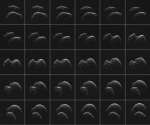 Asteroid 2014 JO25
Asteroid 2014 JO25
19.04.2017
A day before its closest approach, asteroid 2014 JO25 was imaged by radar with the 70-meter antenna of NASA's Goldstone Deep Space Communications Complex in California. This grid of 30 radar images, top left to lower right, reveals the two-lobed shape of the asteroid that rotates about once every five hours.
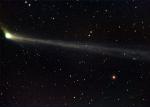 Comet C 2002 T7 (LINEAR)
Comet C 2002 T7 (LINEAR)
22.04.2004
Discovered by the the Lincoln Near Earth Asteroid Research (LINEAR) project in October of 2002, comet C/2002 T7 is now visiting the inner solar system, making its closest approach (see animation by L. Koehn) to the Sun tomorrow, April 23rd.
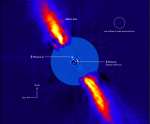 Probably a Planet for Beta Pic
Probably a Planet for Beta Pic
27.11.2008
A mere 50 light-years away, young star Beta Pictoris became one of the most important stars in the sky in the early 1980s. Satellite and ground-based telescopic observations revealed the presence of a surrounding...
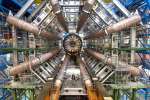 Dawn of the Large Hadron Collider
Dawn of the Large Hadron Collider
24.02.2008
Why do objects have mass? To help find out, Europe's CERN has built the Large Hadron Collider (LHC), the most powerful particle accelerator yet created by humans. This May, the LHC is scheduled to start smashing protons into each other with unprecedented impact speeds.
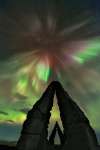 Aurora Over RaufarhЖfn
Aurora Over RaufarhЖfn
30.04.2012
It was all lined up even without the colorful aurora exploding overhead. If you follow the apex line of the recently deployed monuments of Arctic Henge in RaufarhЖfn in northern Iceland from this vantage point, you will see that they point due north.
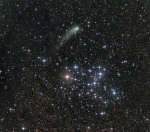 Messier 6 and Comet Siding Spring
Messier 6 and Comet Siding Spring
17.10.2014
This looks like a near miss but the greenish coma and tail of Comet Siding Spring (C/2013 A1) are really 2,000 light-years or so away from the stars of open cluster Messier 6. They do appear close together though, along the same line-of-sight in this gorgeous October 9th skyscape toward the constellation Scorpius.
 Hints of Higgs from the Large Hadron Collider
Hints of Higgs from the Large Hadron Collider
18.12.2011
Why do objects have mass? To help find out, Europe's CERN has built the Large Hadron Collider (LHC), the most powerful particle accelerator yet created by humans. Since 2008, the LHC smashed protons into each other with unprecedented impact speeds.
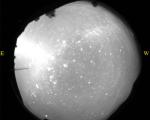 Zodiacal Light and the False Dawn
Zodiacal Light and the False Dawn
15.09.2002
An unusual triangle of light will be particularly bright near the eastern horizon before sunrise during the next two months for observers in Earth's northern hemisphere. Once considered a false dawn, this triangle of light is actually Zodiacal Light, light reflected from interplanetary dust particles.
|
January February |
|||||||||||||||||||||||||||||||||||||||||||||||||